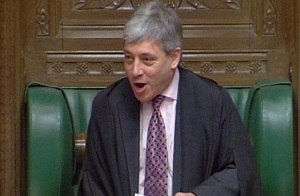Before the vote took place, the Speaker drew attention to, and thanked, members of the press who had been present at the debate for the entire day. After a long day of debating, the final job for the Youth Parliament was to vote on each motion, in order to decide which of the five would be carried forward as the National Campaign for 2012.
Following the ways of the general parliamentary votes, the members used the process of division, leaving the chamber into one of two rooms to vote ‘aye’ or ‘no’ on each of the motions.
Whilst votes were being counted there was the opportunity for an official photo, followed by a speech from Natasha Engle, MP, who thanked all MPs who had made an appearance, as well as the House of Commons staff team. Youth workers were also thanked and members in the chamber showed their agreement with Natasha in this, by offering youth workers a standing ovation. David Clark and Antonia Dixey as well as other UKYP staff and supporters were also praised. Mr Speaker was given special thanks for his continued support to the organisation.
Natasha continued her speech and praised the young people in the chamber for their perseverance and performance in debates, and saying “Amongst things I have picked up today, is this idea that you are adults when it comes to pounds, but children when it comes to voting. I can say that you have shown today, you are not children.”
“This is the first time we’ve ever had parliament week here. The theme of this years event was ‘stories of democracy’ at the end of that week, I think the thanks goes to you the Youth Parliament for having written one of the most important stories in democracy today.”
The Speaker gave a final speech, including thanks to Tim Loughton, Children’s Minister, for his continued support towards the UK Youth Parliament. Mr Bercow also explained his reasons for wanting to chair the Youth Parliament debates, rather than the proposed suggestion of the job going to the deputy speaker.
Mr Speaker highlighted to the chamber the difficulty in making change, and the long-winded process that this involved, but praised the Youth Parliament for making great steps in the right direction. He stated that he would personally send letters to every minister responsible for issues within the five debate motions, urging them to do as much as possible to support these. He hoped this would show the commitment to the Youth Parliament and what we do.
Charley Finch was brought to close the day of debating, as the Member of Youth Parliament who got the most response to the Ballot. Charley thanked PGs and Regional Co-ordinators, as well as BYC on top of those people already mentioned. She then thanked the 65,000 young people who took part in the Ballot, stating that “together we have demonstrated that politics is important to young people, and that our voices are important and should be heard.”
The results were as follows:
– Make public transport cheaper, better and accessible for all: 1st place
– No to tuition fees, yes to graduate tax: 5th place
– Zero tolerance to bullying in schools: 3rd place
– End child poverty: 2nd place
– A greener future for Britain: 4th place
So the National Campaign for the Youth Parliament this year is to “Make Public Transport cheaper, better and more accessible for all”.
Written by Ellie Vesey-Thompson, DMYP Wiltshire
South West Media Rep



You must be logged in to post a comment.